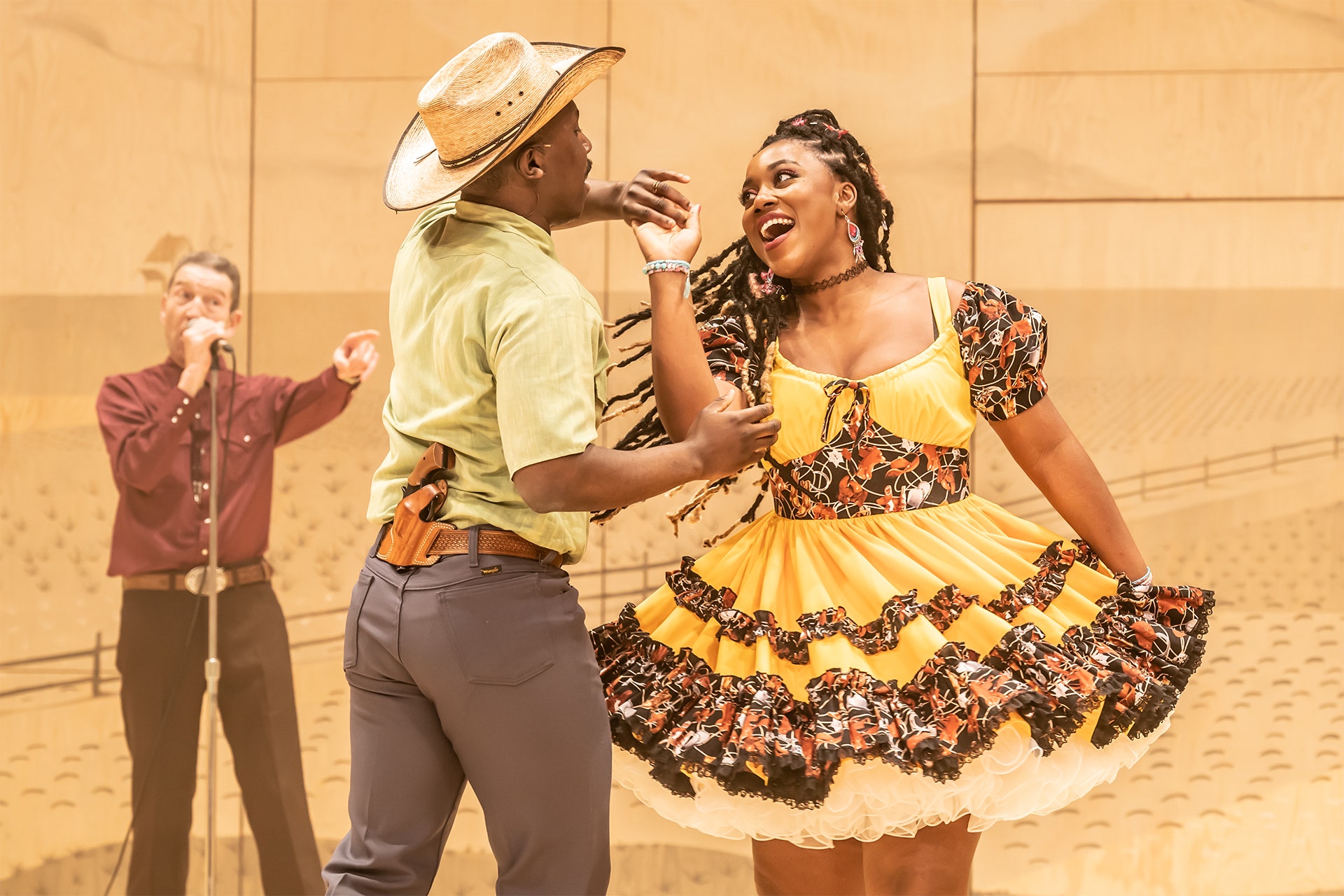
Greg Hicks (Andrew Carnes), Philip Olagoke (Cord Elam) and Georgina Onuorah (Ado Annie) in Oklahoma!
Marc Brenner
Oh, what a compelling production. Here we have an inventive take on the original Oklahoma! at London’s Wyndham Theatre. Director Daniel Fish picks familiar songs apart and draws out their shadowy undertones, all while retaining the signature upbeat score and first-class dancing of the musical tour de force. It’s a masterstroke of musical theatre which leaves everyone thinking – and dancing – long after the performance is done.
Little surprise, then, that this is the play everyone’s talking about. After winning the Tony Award for best musical revival on Broadway, it came to London for seven weeks last year at the Young Vic, where it sold out. Now, it’s already tucked a couple of awards under its belt and is forecast to clean up at the Olivier’s on 2 April.
Anoushka Lucas (Laurey Williams) and Arthur Darvill (Curly McLain) in Oklahoma!
Marc Brenner
‘There’s a bright golden haze on the meadow’: main character Curly opens the play with his familiar southern accent ringing out across the audience. It’s a plaintive but powerful rendition of Oh, what a Beautiful Morning. Arthur Darvill, who plays the character, has a magnetic voice, and a captivating stage presence. His hair flops across his face, his leather riding slacks hang over his jeans as if he’s just come off a horse, and – most interestingly – he strums a modern-day guitar as he sings.
For the first half of the performance we are treated to the comfortable, original songs of the musical. Curly and Laurey spar over the upcoming ball with an attractive confidence; Curly boasts of his ‘shiny little surrey with a fringe on the top’ to a disbelieving Laurey and Will Parker sings of dancing girls back at Kansas city. Peddler Ali Hakim makes us laugh with his attempts to extricate himself from the love triangle he has somehow found himself in, Aunt Ella is familiarly fiesty. The actors give jaw-dropping performances, their voices are electric.
Arthur Darvill plays Curly in Oklahoma!
Matt Crockett
Electricity runs through the very heart of this musical revival. In the corner of the stage stands a microphone, complete with guitar, which Curly never sings without. Is he being painted as some sort of pop-star pinup heart throb? In the final scene, he appears in a white suit with flared trousers, which feels like a homage to the original King of Pop, Elvis Presley. Overhead, kaleidoscopic party banners flap happily, while coloured fairy lights adorn the roof of the theatre. Is this a homage to the garish colours of pop-art? The result is a striking combination of the rugged Oklahoma territory of 1906, an early 1940s Rogers and Hammerstein musical, and modern-day pop-culture. It’s spellbindingly unique.
What else makes this show original? There is an overwhelming sense of stasis which runs in the background of the first half of the play. All of the cast remains on stage, in character. Sometimes they’re sitting around a large trestle table, sometimes brooding in the background, but all of the time they’re watching others perform. Thus, the songs have a frenetic activity which, despite their cheerful pace, contrasts with the brooding sense running on in the background.
Arthur Darvill (Curl McLain) and Anoushka Lucas (Laurey Williams) in Oklahoma!
Marc Brenner
And there is a literal, bright, golden haze – but not on the meadow. Inside the theatre, the lights never dim, and yellow stage lights shine onto actors and audience with equal voracity. The audience are given a part to play in the performance. Most importantly, we’re not exempt from the sinister plot unfurling before our eyes, which culminates in the second half of the performance through the character of Jud Fry, played unfathomably sensitively by Patrick Vaill. As Old Judd is Dead is sung by Curly inside Judd’s smokehouse, the stage and audience are submerged in pitch-black darkness, with only a night-vision camera on Judd’s face, along with projection. A single tear runs down his face as he imagines his own death.
It’s a commentary on mental health, and so much more. Perhaps a nod to the modern-day dark side of social media? Or a literal, zoomed-in look at a character who is normally glossed over in other performances of Oklahoma. We see him in microscopic detail. Somehow, we pity him despite his manipulative and abusive behaviour.
Patrick Vaill (Jud Fry), Arthur Darvill (Curl McLain) and James Patrick Davis (Will Parker) in Oklahoma!
Marc Brenner
When the final song comes round at a galloping pace, and the familiar words of Oklahoma! are pounded out on stage, the original song takes on a new meaning. Mid-way through, Judd is shot by Curly in what almost feels like an execution. As Curly’s face – and Elvis’ white suit – are splattered with blood, the finale is polluted with the dark subtext of unresolved mental health issues, and the harsh, unaccepting society of the deep south in the early 1900s. The final romp to the ‘land we belong to’ in the closing song feels like a vitriolic, territorial howl. It takes on a new meaning with dark currents of colonialism literally splattered across the main character, who is notably a white male.
James Patrick Davis (Will Parker), Patrick Vaill (Jud Fry) and Rebekah Hinds (Gertie Cummings) in Oklahoma!
Marc Brenner
Daniel Fish’s Oklahoma! is a resounding ‘knockout’, as the posters say. But not quite in the way you might expect: the audience is knocked-out by the force of the play, as subtleties buried within a musical are teased out in a masterfully original way. Therein lies the beauty of a production which has rightly become a box-office sensation.
Oklahoma! is on now at Wyndham’s Theatre, London; oklahomawestend.com


